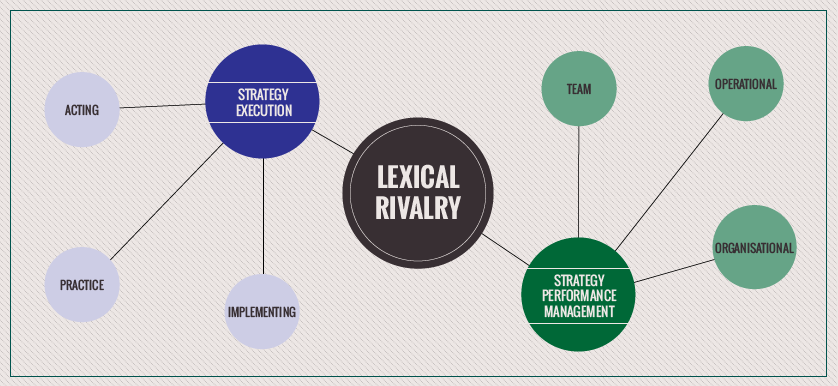Lexical rivalry: “Strategy Execution” versus “Strategic Performance Management”
smartKPIs.com Performance Architect update 27/2010
Over the last few years, the use of the term “Strategy Execution” witnessed a dramatic increase in popularity in the business environment, mainly in the language used by consultants. Decomposing it reveals two terms commonly used in administrative science, both with military roots:
• Strategy – plan of action
• Execution – the act of putting a plan in practice
Together, they express the idea of implementing strategic plans in practice, achieving desired outcomes through sustained effort towards them, or performing as per expectations. In essence … managing performance. In terms of meaning, each of these alternative options would be suitable as replacements of “Strategy Execution” to express the same set of ideas.
If the meaning is not affected, what are the advantages and disadvantages of using the term “Strategy Execution” over “Strategic Performance Management”?
On the use of the term “Strategy Execution”
The first issue with the term is its mechanistic connotation. One of the reasons it is preferred by its proponents is that it illustrates the importance of delivering as expected, or getting things done. However, as both terms have military roots, they remind of the phrase “executing orders as instructed” and the strict discipline of military organizations. This gives the term “Strategy Execution” strict connotations of implementing strategic plans as instructed, without variation, same as “executing orders”. In an environment that is continuously changing, strategic plans are often outdated the moment they are printed. And executing outdated plans can be a risky enterprise. Sure, strategy execution is presented as including a process of continuously renewing strategic plans, which sometimes happens, sometimes, not. There is however a contradiction with the military sense of the term, where orders are in place until their execution and it modifying them based on intelligence from the agent or operator in the field doesn’t happen often.
Besides the issue of how strict the discipline of executing should be, a second issue of the term is its lack of humanistic view regarding the members of the organization. The use of the term “execution” is inferring their contribution is only at the implementation level, without much input to the planning level. They are not there to think or plan, they are supposed to execute as instructed.
On the other hand, the term “Strategy Execution” is interesting, exciting and marketable. It stands out from the multitude of publications on performance management topics, and provides an excellent differentiation platform. It also builds on the basis built by names such as Ram Charan and Larry Bossidy, who published as early as 2002 a book on the topic of execution, laying the ground for a new wave of management books on the topic. In a way it is not surprising that most of the proponents of the term are American authors, as they many have mastered the principles of concept marketing, the marketing of management concepts and ideas to obtain support and attract followers.
On the use of the term “Strategic Performance Management”
Often times the term “Performance Management” is used to illustrate activities related to the achievement of desired outcomes at individual level, by the staff members of organizations. In a way, it is safe to say that this use of the term has won the popular vote, as it is the most common use of the term. However, “Performance Management” is much more than that. If we are to imagine the term “Performance Management” as a cube, the use of the term at individual level would be only one facet of the cube. There are a multitude of other facets that complement the individual level, such as:
• Strategic (organizational)
• Operational (functional are)
• Team (at staff community level)
The essence of the term “Performance Management” remains the same across each of these facets. This is both an advantage and a disadvantage. Many authors prefer avoiding the term as using it is likely to lead the reader to conclude it refers to individual performance management, a topic that is for many neither fresh nor interesting. In term of the marketability of the term, its disadvantages are that it expresses many things for many people and publications face of risk of getting lost in the variety of existing publications on such topics.
At the same time, this variety is also an advantage. Performance Management as a discipline is informed by a variety of other disciplines such as Strategy Management, Operations Management, Human Resource Management, Project Management, Finance, Marketing and Communications, among others. It is in the unique position to act as an integrating management discipline, linking together elements from others, for improved clarity and alignment. The use of the term “Performance Management” reinforces the message of integrating disciplines not only at components level, but also in terms of the approach. Similar performance management principles can be applied at multiple levels in an organization, so why call them differently?
The 20th century was marked by analysis and decomposition of elements. In the 21st century, further benefits can be realized in terms of advances in management by reintegrating elements into a unified body of knowledge and not by continuing the trend of creating new “blends and trends”. New thinking is required and that is informed by integration and not isolation.
“Strategy Execution” versus “Strategic Performance Management”
Some prefer to use more fancy terms such as: “Strategy Execution” instead of “Strategic Performance Management“, or “Operational Excellence” instead of “Operational Performance Management“. As management as a discipline is a democracy, with its advantages and disadvantages, ideas promoted by a louder voice and by supporters triumph, sometimes at the expense of ideas more timidly expressed, though of the same quality, if not higher.
The lexical preference of “Strategy Execution” over “Strategic Performance Management” is such an example. What is not clear is whether the preference is informed by weighing advantages or disadvantages such as the ones illustrated above, or if the terms are used just because they are popular and the “management gurus” use them.
Ultimately it might not matter, as long as results are achieved. However, in terms of credibility of management concepts in the eyes of the public, there might be unintended consequences of such choices, such as the loss of credibility and reticence regarding management rhetoric.
Overall, “Strategic Performance Management” is a more humanistic, learning oriented and integrating term that provides a more vivid panorama of achievement. Put some blinkers on and what you are left with is “Strategy Execution”.
Stay smart! Enjoy smartKPIs.com!
Aurel Brudan
Performance Architect,
www.smartKPIs.com
Notes:
For more details on lexical rivalry, see Hofstadter D. R. (2001), Analogy as the Core of Cognition
Walker, Rob 1992,“Rank Xerox – Management Revolution”, Long Range Planning, Vol. 25, No. 1, pp. 9 to 21

Tags: Aurel Brudan, Lexical Rivalry, Management performance, Performance Architect Update






